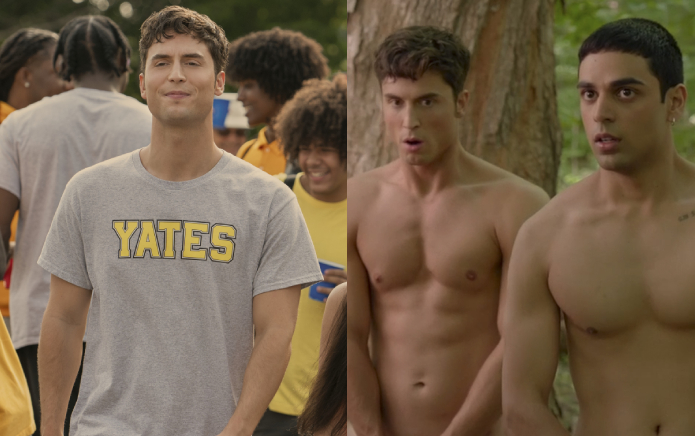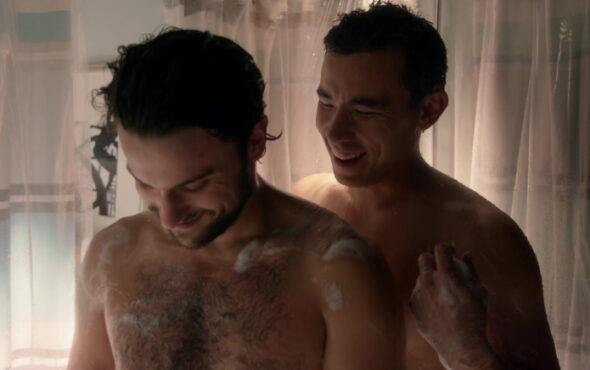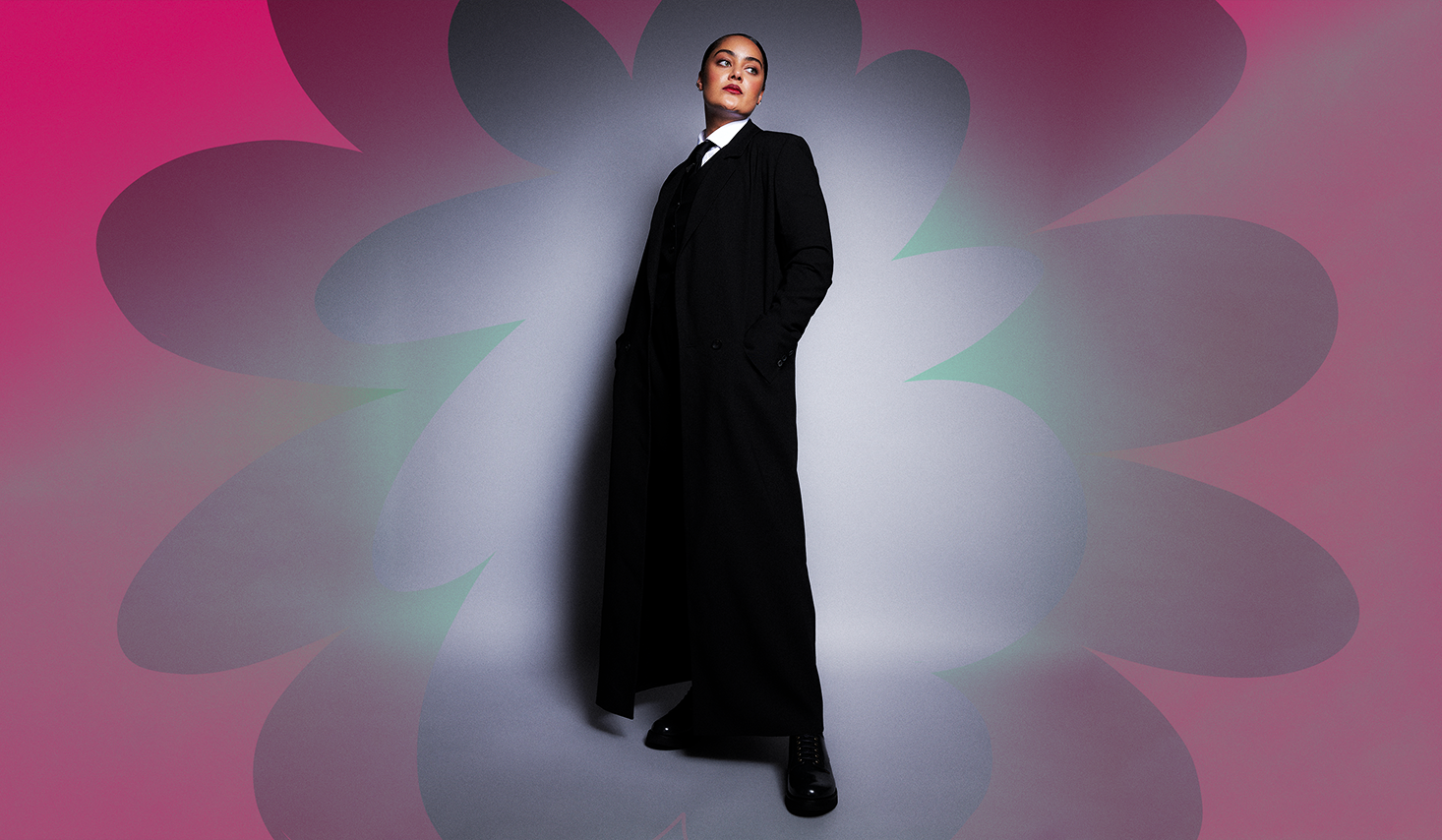
The chaotic and often jarring realities of second year uni is back on our screens with Big Boys season two, with even more splashes of camp, cultural representation from the 2010s. The gang – Dylan Llewellyn (Jack), Jon Pointing (Dann), Izuka Hoyle (Corinne) and Olisa Odele (Yemi) – have reunited on screen for the acclaimed millennial coming-of-age comedy and, thankfully, the series is still an Alison Hammond stan account.
This time around, however, new facets of Corinne’s essence are explored, namely the unfussy reveal of her bisexuality. “It’s in such a nonchalant, to the point, flippant way,” the Scot tells GAY TIMES. The plotline sits in parallel to the climatic build of season one and Jack’s own coming out to his family. Multiple versions of coming stories was a deliberate move from creator Jack Rooke, and is a continued reason why the season is beloved amongst the LGBTQIA+ community. According to Hoyle, Big Boys “opens up the big old couch that we’ve created for everyone to come and sit on and feel seen” and gently pushes boundaries of on-screen representation; showing the “raw”, nuanced and wildly unique experience each LGBTQIA+ individual goes through.
The “whole show is supposed to be a realistic reflection of society told through the minority’s POV,” says Hoyle. “There is a pigeon hole if you are queer woman of colour, you look a certain way, you act a certain way. It’s just wildly untrue.” Tired tropes are not leaned into, rather Corinne’s Scottish mixed-race heritage roots and friendship with Yemi underpin her character experience: “She is not slotting into what one might think of two people of colour from the UK hanging about in London. There is a real acknowledgment of the fact that she is Scottish and she has been raised there, and she has had a different upbringing to Yemi. Yet, the two of them are bonding over shared experiences and different experiences.”
Surrounded by her “27 plants,” Hoyle speaks with GAY TIMES about why Corinne is not “slotting” into restrictive archetypes of queerness, celebrating the ‘life-saving’ effect of platonic friendships and the cast’s mutual ‘obsession’ with each other.
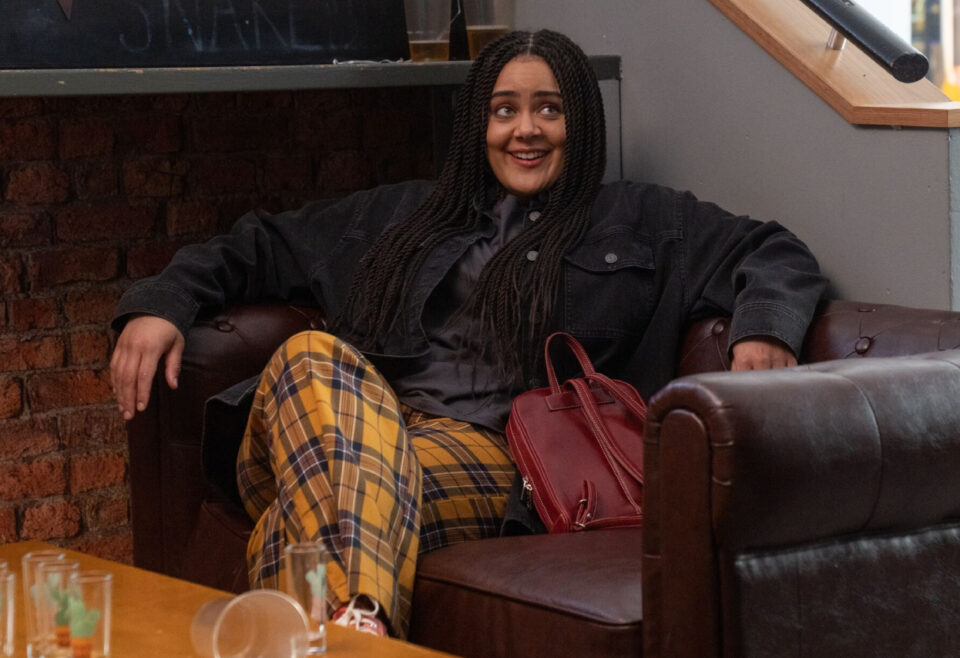
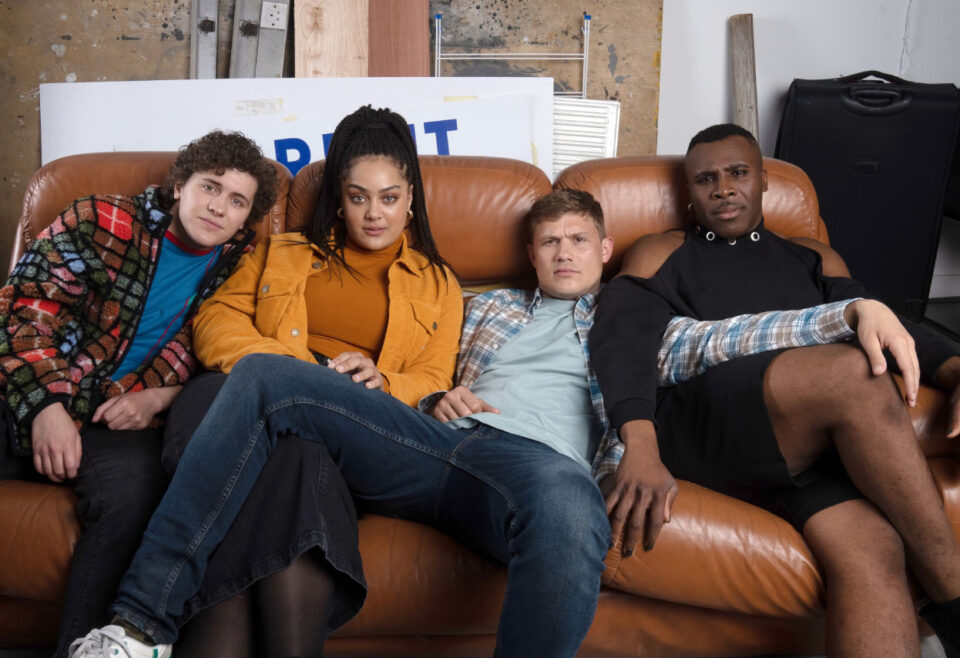
Corinne comes out as bisexual in the first episode. How does this new dimension of her essence impact and craft her storyline?
It’s the way in which she tells them she’s bisexual. It’s in such a nonchalant, to the point, flippant way and it’s not something that she cares about that is a big part of her, it’s just in the sense that Corinne is confident and determined in her life. Part of who she is, is her queerness and I love the way there is no big scene about it. It’s just what I am. It’s great when you’ve got a show that explores sexuality through different characters and ways of coming out. Corinne’s is so true to her character and encapsulates a demographic of people who maybe have been accepted quite quickly and she’s not had to have a situation like Jack’s or Yemi’s character – which is wicked. When Jack wrote it in I was like, ‘Yes babe. I love.’
There is a build across season one for Jack to come out to his mum, whereas Corinne comes out immediately. How important is it to have these two storylines in tandem to reflect the individual experience of coming out?
Exactly, that’s it. The whole show is supposed to be a realistic reflection of society told through the minority’s POV, whether it’s people who are grieving, struggling with their sexuality or their mental health. People struggle in their own individual way, and [Rooke] choosing to juxtapose that quite well, is gold dust. It will make people who’ve had similar experiences to Corinne feel seen, versus Jack’s experience. It opens up the big old couch that we’ve created for everyone to come and sit on and feel seen.
Rooke brilliantly interlaces his own life experience into the creation of the show. Is there anything within your own life experience that you have drawn upon to bring Corinne to life?
The tiny little micro-aggressions that she’s had in season one, where people are getting her name wrong, and in season two where Yemi and Corinne are bonding more. We are choosing to zone in on their relationship and what I love about it is that Corinne is quite clearly from Scotland and of mixed-race heritage and she’s got a Black friend. But, what’s not happening is she is not slotting into what one might think of two people of colour from the UK hanging about in London. There is a real acknowledgment of the fact that she is Scottish and she has been raised there and she has had a different upbringing to Yemi. Yet, the two of them are bonding over shared experiences and different experiences. Also, Corinne has traits that I would love to have, so when I hangout with her on set I get to vicariously live through her unapologetic confidence and how smart she is. Jack and I would have a running joke and Jon would look at me and see when my eyes would glaze over and be like, ‘What’s that word?’ Being the smartest chick in the room, being so direct and knowing what you want within a friendship group of little gorgeous aliens is so fun.
How important is it for viewers to see queer women of colour such as Corrine, and not a continued depiction of one funnelled example of queerness represented in the mainstream?
Insanely important. It just adds to the whole conversation of feeling seen. Because it is great to have depictions of queer women of colour on screen, but if they all start to fall into a similar demographic and you have actors playing similar characters all the time, then it doesn’t help the movement of educating those that are uneducated. There is a pigeon hole if you are a queer woman of colour: you look a certain way, act a certain way and it’s just wildly untrue. A lot of the audience that perhaps aren’t queer have fallen in love with Jack’s show and might say Corinne seemed something straight or whatever. But, it just goes to show you really don’t know. You can’t make that judgement of people, especially when it comes to their sexuality. Sexuality can be shown in different ways through your femininity, masculinity and androgynous ways. There’s such a spectrum, and it is so important for us to place characters on all different levels of that spectrum as that ultimately helps us reflect an honest society within the queer community. That is another reason why people have connected so closely and deeply to Big Boys.
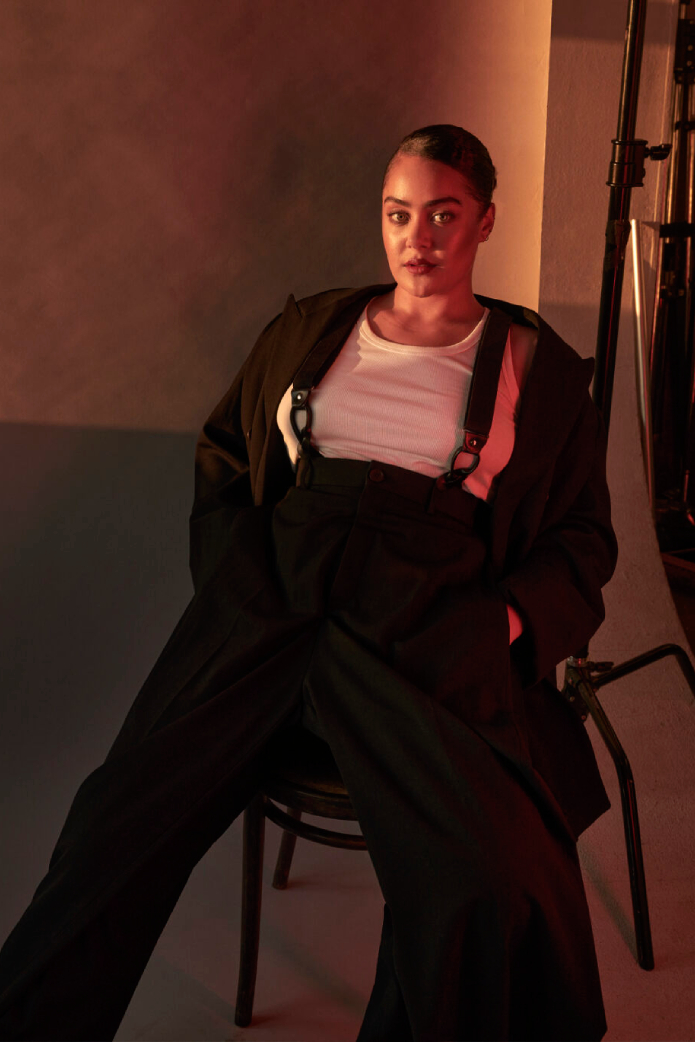
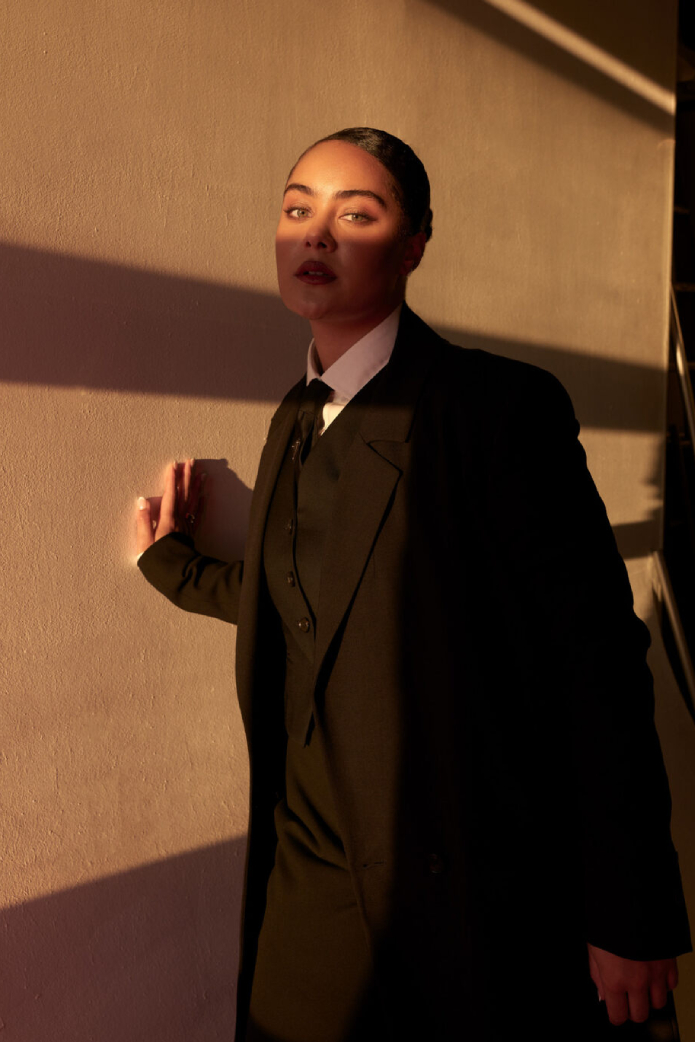
There’s an undeniable chemistry between the cast. Can you take me back to the first read? Was the bond always there? How did you develop that connection?
It’s so funny, even as you say it I could feel my cheek bones engaging.
Your face just lit up.
I love them so much. We’re obsessed with each other. Most of the main cast had been attached to Big Boys for a lot longer than I had, they had shot the pilot maybe four years ago and Corinne wasn’t a character that existed then. The chemistry read with Jon was the moment that I found Corinne. I had never had a chemistry read with someone where I’d gone, ‘Oh this is chemistry.’ A lot of the time in chemistry reads, people will fake it because they want the job. When I met Jack I was like, ‘Oh you’re a funny bitch, we are going to have a giggle!’ and obviously we’ve become too close. When we started shooting, Camille Cudori (Peggy) was immediately like a second mother. We chatted away about the moons and the stars and what we had for dinner. We are very lucky to make good work with good friends and we are very present about that, because who knows when that will happen again?
It sounds wonderful. Chosen family is often a shared queer bond. How do you feel Big Boys/your character explores the idea of this in the new season?
Corinne has become a classic example of you never know what is going on with somebody, and don’t make assumptions, and that proves true with the way in which she comes out. We all come from different places and, within the queer community, chosen family proves to be such an important way of healing through life, feeling seen and being supported. Sometimes, blood family can’t offer that. I am someone whose platonic relationships have been paramount in my life, and I wouldn’t be the woman that I am and be in the place that I am without them. If 14-year-old Zuks had a show like Big Boys, that gave weight and a moment to shine a light on chosen family, I would have fallen off the couch and burst into tears and simultaneously laughed. It isn’t explored enough. When we explore relationships in film, we tend to focus on romantic monogamous relationships. Actually, the ones that save and make us are platonic friendships and chosen families. They are the people we choose to spend our lives with, to grow with, to learn with. It’s paramount that we have that representation.
I echo the sentiment of the importance of chosen family. You’re no stranger to working with material that is nuanced and tackles themes of sexual identity, mental health, addiction and inappropriate behaviours in the workplace, from Boiling Point to Big Boys. What draws you to work on this kind of material?
It is interesting to delve into. I always try to find things that feel real and will challenge me. I want to tell stories that are going to help more of the minority sitting at home. I want addicts to feel seen, people who have experienced sexual abuse or sexual violence, or any of the demographics that Big Boys falls into. These are things that, statistically, so many of the British public will endure. So when people are sitting at home watching their screens, I want to be a part of work that is transcending and represents an honest and realistic British society. That is what shows like Boiling Point and Big Boys do. They are definitely a slice of the life I’ve lived and the people I’ve seen and interacted with, and to be able to get given the responsibility to portray that is an honour.
At the Big Boys premiere, you told GAY TIMES that you’re a crystal collector and “very witchy”. Have you always been a spiritual person?
I have! My room is not the cleanest, so I can’t give you a tour but I currently have 27 plants in my room. I’m from Scotland and I love hiking, swimming in the sea and being in the mud. In London, you don’t necessarily have access to a lot of that wildlife often, so I like to have as much wildlife in this room as possible. I wouldn’t call myself a ‘spiritual mother’. I would call Camille Coduri the mother of all spirits! She’s a grand high witch, but I’m definitely very spiritual and crystals and plants have always been something that spoke to me. If there is any god, it is the universe and mother earth. When I connect with people, women and witches, it is always an energy that you cannot deny. The older I get the more I feel it is real because I’m tingling. I love anything earthy, real and grounded. I love human beings at their most raw. It reminds you that we are all just little earthlings and we are all just existing and having our own experiences.
I’m impressed – all of my plants last five weeks, not five years.
I know – I couldn’t believe it babe. I sometimes look and think, ‘You’re still with us pal!’ I never thought I would get so much validation and happiness in seeing a plant grow and thrive. This Devil’s Ivy that wraps around my room is over 20 feet long.
Lastly, Big Boys has a 100% approval rating on Rotten Tomatoes and a loving loyal fanbase. What has it meant to you to be involved in a show that has received such a positive response from viewers?
It’s a dream. It’s like it’s too good to be true, but it’s not, it’s reality. It is amazing having the ratings that we do and the critical acclaim that has happened. The most validating thing about it is that the fans are so happy and feel seen. There are so many people that fall within the demographics of Big Boys that feel seen, supported and healed, or that they can heal. When you meet these people, hear what they are saying, look them in the eye and see how much it means to them, there’s nothing that can top that – it’s an honour.
Big Boys is available to stream in the UK on Channel 4, Sky Go.
